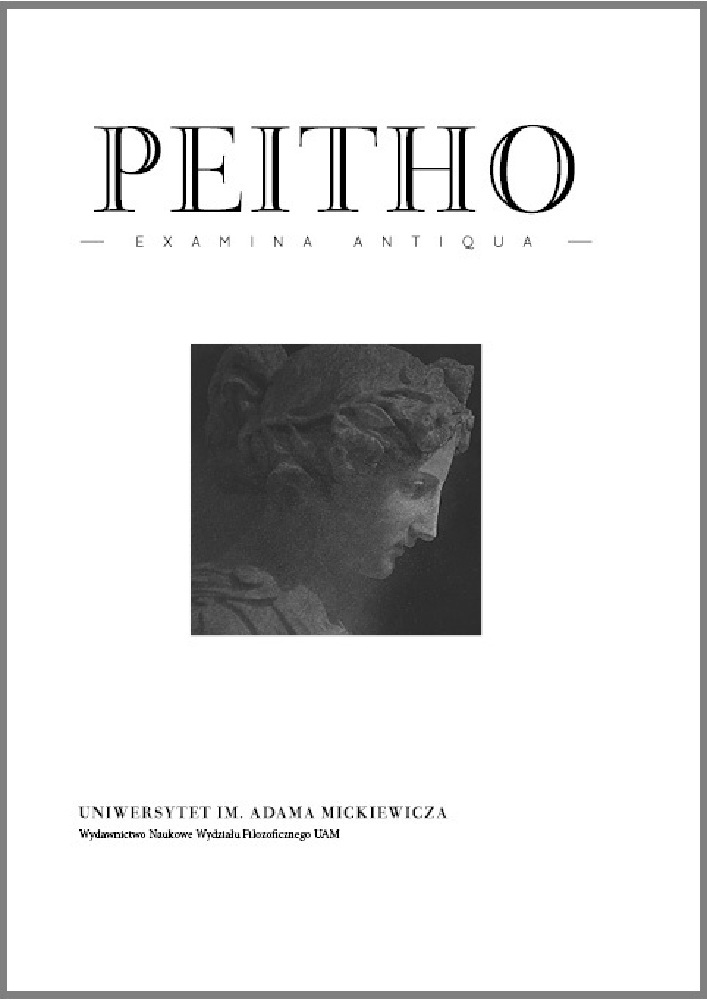Abstract
The present study focuses on research about reincarnation in order to formulate some preliminary conclusions concerning various philosophical theories. The overview extends over a considerable period range, from ancient Greek and up to the patristic tradition. The relevant issues include the problem of evil, the question of human decomposition and death as well as reincarnation (metempsychosis) in the Platonic thought. The problem of evil is a problem of reason that emerges from the philosophical background of ancient Greek thought but also from the subsequent Christian patristic thought and transforms itself into diverse concepts (e.g. the significance of justice). According to the original thought of Socrates, evil is associated with ignorance and good with knowledge. This point of view is given a brief review in the philosophical thought of several important representatives of the patristic tradition (e.g., Origen and Gregory of Nyssa). On the other hand, the idea of immortality of the soul, which dates to the religious movement of the Orphic mysteries (seventh century BC) means that the persistence of the immortal soul at the moment of death needs the use of a new body. This essay will try to analyze the ancient character of the myth of reincarnation through the perspectives of philosophy and religion.
References
Adnes, P., 1932–1995, «Théories de la mystique chrétienne XVIe–XXe siècles», in: Dictionnaire de spiritualité ascétique et mystique, t. X, Paris, pp. 1919–1939.
Arruzza, C., 2007, «La matière immatérielle chez Grégoire de Nysse», Freiburger Zeitschrift für Philosophie und Theologie 54, pp. 215–223.
Bastin-Hammou, M., 2009, Juan Carlos Sánchez León, L’antiquité dans l’oeuvre d’Antonin Artaud, Franche-Compte, pp. 351-352.
Beaupre, J., 2007, Les éléments orphiques dans le Phédon de Plato, Montréal.
Bouchilloux, H., 2005, Qu’est – ce que le mal?, Paris.
Blocher, H., 1990, Le mal et la croix, Sator.
Blocher, H., 1997, Fac étude : la doctrine du péché et de la rédemption, Vaux-sur-Seine.
Canevet, M., 1968, «Nature du mal et économie du Salut chez Grégoire de Nysse», Recherches de Science Religieuse (RSR) 56, pp. 87–95.
Coutoure, A., 2000, La réincarnation au-delà des idées reçues, Paris. 2013.
Dekany, A., 2002, «Le rôle du corps chez Descartes dans le mécanisme des passions», in: Le Portique [En ligne] 9, mis en ligne le 08 mars 2005, consulté le 07 septembre 2015, http://leportique.revues.org/178.
Donnet, D., 2001, «Aux sources préchrétiennes de l’Occident : Aspects de la réincarnation dans la pensée grecque», FEC – Folia Electronica Classica (Louvain-la-Neuve) 1, http://bcs.fltr.ucl.ac.be/FE/01/Reincar.html.
Daniélou, J., 1973, «Metempsychosis in Gregory of Nyssa», in: D. Neimann, M. Schatkin (eds.), The Heritage of the Early Church. Essays in honour of Georges Vasilievìch Florovsky on the occasion of his eightieth birthday, Rome.
Ferrari, G., 2005, Le mythe d’Er, art, in: M. Dixsaut, F. Teisserenc (eds.), Études sur la République de Platon, vol. 2, Paris.
Gregoire de Nysse, 1995, Attaque les trois formes dans : Sur l’âme et la résurrection, Cerf, pp. 88–92.
Gavray M.A., Dixsaut M. (dir.), 2007, Études sur la République de Platon, vol. 1–2, pp. 393–395.
Glauser, R., 2003, «Le problème du mal dans la philosophie analytique de la religion», Association Revue International de philosophie 57, pp. 285–313.
Haldas, G., 2007, Socrate et le Christ, Paris.
Vanier, J., 1965, «Le Bonheur principe et fin de la morale aristotélicienne», Revue des Études Grecques 78, pp. 694–697.
Kant, E., 2009, Sur l’échec de tout essai philosophique en matière de théodicée, Nantes.
Kant, E., 2004, La religion dans les limites de la simple raison, Paris.
Levy, A., 2000, «Aux confins du créé et de l’incréé: Les dimensions de l’épectase chez Grégoire de Nysse», Revue des Sciences Philosophiques Et Théologiques 84, pp. 247–274.
Laurent, J., 2002, La mesure de l’humain selon Platon, Paris.
Ladouceur, P., 2006, «Christianisme et réincarnation», Contacts, Revue française d’orthodoxie 58.
Laurent, J., 2011, «Dire l’ineffable : l’ascèse discursive de Plotin», in: B. Pérez-Jean (ed.), Les Dialectiques de l’ascèse, Paris, pp. 281–293.
Laurent, J., 1999, L’homme et le monde selon Plotin, Paris.
Merle, S., 2008, «Le mal chez Spinoza», Reçu major au CAFEP de philosophie, Colloque virtuel sur le mal, juillet-septembre, https://www.google.pl/url?sa=t&rct=j&q=&esrc=s&source=web&cd=1&ved=0ahUKEwi7wZqM3Z7JAhUDjnIKHZcPCoMQFggfMAA&url=http%3A%2F%2Fwww.approximations.fr%2Fo2php%2Fattach.php%3Fpid%3D18294&usg=AFQjCNH4bW2ebPYbau4HsboUkbjPSRzQ7g&sig2=C1zhbOvlv-tLLEI2h9RIEw&bvm=bv.108194040,d.bGQ&cad=rja (20.10.2015).
Morand, A. F., 2001, Études sur les hymnes Orphiques, Leiden et Boston et Köln.
Perrin, A., 1992, «L’âme et le corps», Cahiers philosophiques 53, http://philo.pourtous.free.fr/Articles/A.Perrin/ameetcorps.htm.
Van Eersel, P. (ed.), 2009, Enquête sur la réincarnation, Paris.
Vergez, A., 1969, Faute et Liberté, Paris.
License
Peitho provides immediate open access to its content on the principle that making research freely available to the public supports a greater global exchange of knowledge.
